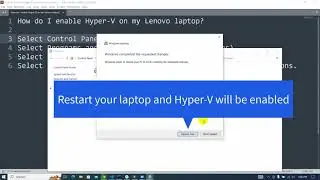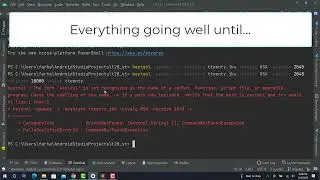How to enable Hyper-V on windows machine
Hyper-V is a virtualization platform developed by Microsoft. It allows you to create and run virtual machines on your Windows computer. Virtualization enables you to run multiple operating systems on a single physical machine, which can be useful for testing software, running legacy applications, or isolating environments.
Enabling Hyper-V on your Windows machine is often required when working with Android emulators that use hardware acceleration. Hyper-V provides a hypervisor-based virtualization platform, and Android emulators, such as those used in Android Studio or Microsoft's Visual Studio Emulator for Android, leverage this technology to create and run virtual machines more efficiently.
Here's why Hyper-V is beneficial for Android emulators:
Performance:
Hyper-V allows for hardware-assisted virtualization, which means that the Android emulator can take advantage of your computer's hardware resources more efficiently. This can lead to better performance when running virtualized Android environments.
Isolation:
Hyper-V provides a level of isolation between the host operating system (Windows) and the virtualized Android environment. This is important for testing and development purposes, as it ensures that changes made within the virtual machine do not impact the host system.
Compatibility:
Some Android emulators, such as the Google Android Emulator that comes with Android Studio, are designed to work optimally with Hyper-V. Enabling Hyper-V ensures compatibility and may resolve issues related to hardware acceleration when running the emulator.
Integration with Development Tools:
Android development tools and frameworks, especially those provided by Google and Microsoft, are often designed to work seamlessly with Hyper-V. This integration simplifies the process of developing, testing, and debugging Android applications on Windows.
It's worth noting that not all Android emulators require Hyper-V. For example, if you're using emulators like BlueStacks, Genymotion, or others that don't rely on hardware acceleration through Hyper-V, you may not need to enable it. However, for official Android development using Android Studio or Microsoft's development tools, enabling Hyper-V is a common recommendation for better performance and compatibility.











![[Solved] Unhandled Exception: PlatformException(null-error, Host platform returned null) firebase](https://images.videosashka.com/watch/Qn2ysnVMvEE)
![[Solved] Flutter- DropdownButtonFormField overflow-on-big-text](https://images.videosashka.com/watch/ewrZjm0jXwA)


















